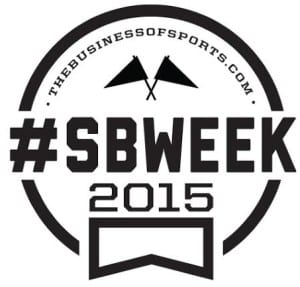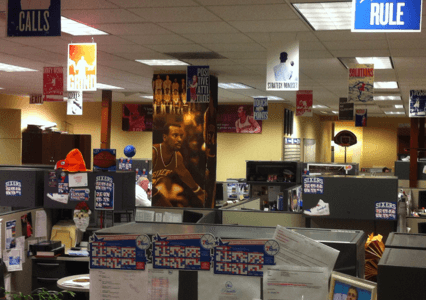After the first round of the Baylor S3 Pro Day of virtual recruiting with 30 interviewers, 54 of the students rated each of the interviewers, selected their favorite two interviewers, and commented on one that didn’t go as well as hoped. After the second round of S3 Pro Days on March 5 (click here for more info), we will distribute information to interviewers (who also get the chance to rate the students on their interviewing skills). The S3 Best Interviewer Awards for S3 Sales and S3 Analytics will be announced for the S3 Awards Banquet on April 14.
These evaluations are much like teaching evaluations. We certainly prefer students enjoy the experience. Admittedly, sometimes learning experiences can cause user discomfort. So, good on you as professor or recruiter if you can do both: Supply enjoyable learning experiences that serve the welfare of all parties for both the short and long term. To that end, we offer 45 comments about what students liked best about interviewers, which thankfully outweigh the 24 comments on areas of improvement. Learn as you will from these.
Student POV
Interviews for Sports Sales & Analytics Internships & Careers
45 Areas of Excellence
| 1. Intentionally listened and asked good questions. |
| 2. Asked very thoughtful questions and really answered my questions well. |
| 3. Most enthusiastic and didn’t make it feel like there was a power difference between him and me. |
| 4. Most willing to show me things like what they do in Tableau. |
| 5. Just fun to talk to. |
| 6. Really easy going and easy to talk to. |
| 7. They stood out above the rest for their openness while discussing their roles and the company culture at their respective teams. They came across as completely genuine, giving me their unfiltered opinions on their workplace instead of telling me any kind of pitch. |
| 8. Made me feel instantly comfortable during both conversations I had. |
| 9. Super genuine and friendly; They were not intimidating at all and very helpful in explaining their role and answering my questions. |
| 10. Very easy to talk to and did a great job answering any questions I had. I very much enjoyed talking and felt at ease and was disappointed when our time was up. |
| 11. Asked unique and challenging questions that kept me on my toes. |
| 12. Was genuine and kind while also getting down to business without any unnecessary conversation. |
| 13. Very personable and made a hectic time feel relaxed, calm and helpful. Made the conversation feel mutually beneficial which was great. Super informative and helpful. |
| 14. We had a really great conversation about just life. We shared a lot of similarities; was informational, and I got to walk through my resume. |
| 15. Took an interest in me beyond my job qualifications and wanted to get to know me better on a personal level. They made me feel like they wanted to speak with me and told me I could reach out any time in the future. |
| 16. Asked great questions and directed good conversation! Awesome at engaging and made me feel really comfortable. |
| 17. I was able to see how well they enjoyed not only working in their field but with each other too. I also felt relaxed in the interview and it was one of the ones that I actually had fun being interviewed. |
| 18. They were the two most enthusiastic people I talked to. I made really good connections with both of them. They also were very interested in making it clear that if I were hired that they would invest in my career to the fullest extent. |
| 19. Was very specific and had the 30 min interview laid out in sections of what to accomplish. I got to do a mock phone sale and a 45sec pitch. |
| 20. Genuine and engaging during our talk. |
| 21. Very open to answer any and all questions and truly share passion for the job and role as a manger. Provided an open and transparent look at goals for those new to the organization and what managers seek to get out of them. |
| 22. They made the conversations really smooth and easy and showed a genuine interest in me. |
| 23. Was very open and had great energy. Seemed very invested in our interview and even joked around a little bit. Overall a great interview and I was incredibly impressed with the organization. |
| 24. They gave great insights on what their companies did and gave in-depth analysis of the field of analytics, especially CRM and BI. Also, they made the effort to personally connect with me. |
| 25. Asked challenging questions and, in the interview, pushed me to do better. Charismatic and has good leadership. |
| 26. It felt like they were actually interested in getting to know me. |
| 27. They had amazing humor and personality and seemed really interested in talking to me! They acknowledge all of what I said and asked follow-up questions accordingly. They made the speed dating a lot of fun because it may have been an interview, but it seemed more like catching up with an old friend! |
| 28. Seemed very interested throughout our entire call and even asked for a second interview to better our connection in order to be a future reference for myself. |
| 29. Discussed the many ways they took care of employees during the ongoing pandemic, both with their mental health and with their paychecks. Detailed how the team handles the social issues that have become as prevalent as ever in recent times. |
| 30. Open, friendly, and honest. Made me feel more comfortable. |
| 31. Extremely genuine and excited to hear about why I want to get into sports. They asked very good questions and went into detail when answering questions that I asked about their organizations. Both came across as wanting to help me in my journey in any way they could. |
| 32. Very interested in me and my future goals, very engaging. |
| 33. Super high energy and gave me an awesome description of time with the team. Super helpful and seemed genuinely interested in my career growth. |
| 34. Asked questions about my personality and we were able to chat and have a great conversation! |
| 35. Gave me a whole lot of advice on how I could answer interview questions better. Offered to connect me with other people within the organization, which was awesome. |
| 36. Truly took the time to know me and understand what I was looking for in a future job opportunity. |
| 37. Very encouraging. |
| 38. Let us know that no matter what happens they were here to help us. Even if that means we go for a decision and it does not include their organization. That is admirable. |
| 39. Took the time to know me knowing that I am only a sophomore yet was intrigued when looking at my LinkedIn profile. So kind and just wanting to help. |
| 40. Extremely kind, was prepared with knowledge about me, insightful answers to my questions, willing to help, relatable. |
| 41. Very interested in what I had to say and gave me great advice. |
| 42. Very kind and helpful. |
| 43. Gave great advice, flowing conversation, tremendous insight into job and analytics in sports. Willing to help. |
| 44. Seemed very genuine in wanting to get to know us. Gave me some valuable advice and perspective. |
| 45. We had a fantastic conversation about the importance of mental health in the workplace (and in general) and the emphasis put on it. |
24 Areas of Improvement
| 1. Really didn’t have much of an interview experience. It was too casual. |
| 2. Questions were very vanilla. Couldn’t get a good read off them. |
| 3. Didn’t really seem like they wanted to be there. |
| 4. Wasn’t easy to talk to. |
| 5. I sort of felt like I had to lead the conversation, where with the other recruiters, they were the ones guiding it. |
| 6. Seemed not to take our 10-minute call seriously. Never made eye contact and was constantly looking around the room. Gave cookie-cutter monologue and nothing more. |
| 7. Asked very structured concrete questions. I heard from others that they kept people over time and shorted others. Didn’t appear open. |
| 8. Informational but it was very cold. It wasn’t a natural conversation like the rest of my 10 min talks. |
| 9. Rapid fire questions, less conversational interview (granted, we only had 10 minutes). |
| 10. Asked a lot of questions that didn’t pertain to anything important and also not related to S3 or internships. |
| 11. Did not feel a connection with the organization or interviewer specifically. Nothing against, is a great person. I just did not find myself enjoying the interview or the chemistry. |
| 12. A stand-in for my interview didn’t seem too ecstatic to be there. Seemed very dry. |
| 13. Not very engaging and didn’t show a lot of emotion. |
| 14. Had one short interview where I was asked very off-topic and slightly offensive questions. |
| 15. I was confused on the style of the interview. Seemed harsh. |
| 16. Seemed very distracted; like the focus was elsewhere from the start. It threw me off a little bit and it felt like we never really got into the interview at all. |
| 17. Didn’t have a lot of emotion and didn’t seem that interested in talking to me. It felt like more they were just doing this to put a check mark on their calendar. |
| 18. Felt more like an actual interview and less of a conversation. It was intense, which is fine, but I enjoyed some other conversations more since they were more chilled. |
| 19. Conversation was not engaging and was not very interested in me or what I was saying. |
| 20. Didn’t really seem very interested in being at the event. Wasn’t super open about time with organization, which made the interview pretty difficult to stay engaged with. |
| 21. Not all that open to talking much about the organization and the conversation was hard to get through. |
| 22. Impersonal and mechanical conversation. Improved in the second round of interviews but felt like they were checking boxes rather than trying to make a connection or be a resource. |
| 23. Typing the entire time. |
| 24. It was so awkward; I was given short answers to questions that I asked. |








 Tickets for these events are $5 in advance or $10 at the door with 100% of this money being donated to
Tickets for these events are $5 in advance or $10 at the door with 100% of this money being donated to 






